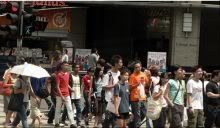PN Balji / Guest Writer
 It was a popular question to ask: Is Singapore ready for a non-Chinese Prime Minister? Mr Lee Hsien Loong’s answer was, as expected, predictable.
It was a popular question to ask: Is Singapore ready for a non-Chinese Prime Minister? Mr Lee Hsien Loong’s answer was, as expected, predictable.
It is possible, but not any time soon.
Hello, what else do you expect the PM to say?
I wonder what the Singapore establishment’s thinking was when a young, wet-behind-the-years American — and, mind you,a black at that — appeared on the American political stage with an audacious message to change his country.
More than a hint came from an establishment figure, Mr S Dhanabalan, when he responded this way to a question on Mr Barack Obama’s chances in the American presidential elections: “Well, he may not even make it through the primary, right?” he said a year ago.
How wrong this former political heavyweight and now chairman of Temasek Holdings was. Fast forward a year later, and flying in the face of Mr Obama’s momentous victory and the results of two recent surveys by the Institue of Policy Studies and the S Rajaratnam School of International Studies, Mr Lee’s reiteration of an age-old belief must have irked many thoughtful and forward-looking Singaporeans.
The issue is not really about race. There are three other obstacles to a non-Chinese becoming PM.
The country’s one-party politics, stability and demographics.
Mr Obama arose in a country where a two-party system is fully-entrenched and at a time when the US was directionless, in a mess and when the gap between the whites and the African Americans, Latinos and Asians was being closed.
All three conditions don’t exist in Singapore.
The possibility of a strong opposition party emerging to challenge the dominance of the ruling People’s Action Party is remote, if not unimaginable, at least in the immediate future. If there were such a party with a Malay or Indian Singaporean as its leader and they had a sound alternative plan for Singapore‘s future, what is there to say the citizens won’t give them the vote.
Nothing, if the other two ingredients of instability and a more equal racial mix are present. Unless a rogue leader in the guise of a white shirt and white trousers manages to seize control of both the party and government and plunder the country, the chances of this oasis of calm turning into a ravaged city are extremely slim. So why take a gamble and test the waters with a non-Chinese leader?
As for demographics, Singapore‘s whopping 74.7 per cent Chinese population makes that gamble unnecessary.
The only disconcerting aspect in this debate is that a minority candidate who has the professional and personal credentials to be the PM won’t get that opportunity to make it to the top.
Now, what does that say about the government’s often-stated belief in meritocracy and racial equality?
Mr Dhanabalan had that opportunity in 1990 but he was ruled out because of his race. Today, 18 years later, things have hardly changed.
In a country where the government has great clout and has immense persuasive powers to change mindsets, what is needed is a belief that a truly inclusive society can only be to Singapore‘s reputation and advantage.
Who else to effect that change than a Prime Minister who gave hope to so many Singaporeans with his inclusive society speech more than four years ago?
———-
About the author:
P. N. Balji has 38 years experience as a journalist and is now director of the Asian Journalism Fellowship, a joint project of NTU and Temasek Foundation.
———
